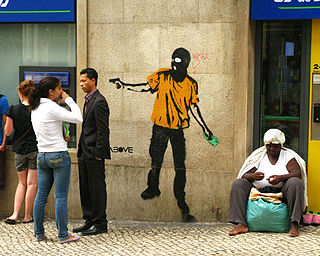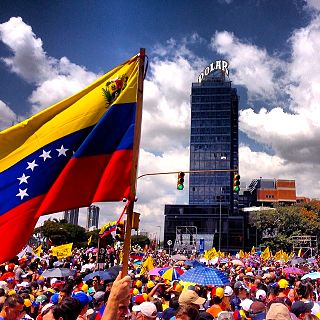
A protest is a public act of objection, disapproval or dissent against political advantage. Protests can be thought of as acts of cooperation in which numerous people cooperate by attending, and share the potential costs and risks of doing so. Protests can take many different forms, from individual statements to mass political demonstrations. Protesters may organize a protest as a way of publicly making their opinions heard in an attempt to influence public opinion or government policy, or they may undertake direct action in an attempt to enact desired changes themselves. When protests are part of a systematic and peaceful nonviolent campaign to achieve a particular objective, and involve the use of pressure as well as persuasion, they go beyond mere protest and may be better described as civil resistance or nonviolent resistance.

Protest art is the creative works produced by activists and social movements. It is a traditional means of communication, utilized by a cross section of collectives and the state to inform and persuade citizens. Protest art helps arouse base emotions in their audiences, and in return may increase the climate of tension and create new opportunities to dissent. Since art, unlike other forms of dissent, takes few financial resources, less financially able groups and parties can rely more on performance art and street art as an affordable tactic.

Artivism is a portmanteau word combining art and activism, and is sometimes also referred to as Social Artivism.

La Calavera Catrina had its origin as a zinc etching created by the Mexican printmaker and lithographer José Guadalupe Posada (1852–1913). The image is usually dated c. 1910–12. Its first certain publication date is 1913, when it appeared in a satiric broadside as a photo-relief etching.

The protests of 1968 comprised a worldwide escalation of social conflicts, which were predominantly characterized by the rise of left-wing politics, anti-war sentiment, civil rights urgency, youth counterculture within the silent and baby boomer generations, and popular rebellions against state militaries and bureaucracies.

Patio Maravillas was a multi-purpose self-managed social centre which occupied several spaces in central Madrid between 2007 and 2015.
JoFF Rae is the pseudonym of a New Zealand event producer, designer & artist.

María Teresa León Goyri was a Spanish writer, activist and cultural ambassador. Born in Logroño, she was the niece of the Spanish feminist and writer María Goyri. She herself was married to the Spanish poet Rafael Alberti. She contributed numerous articles to the periodical Diario de Burgos and published the children's books Cuentos para soñar and La bella del mal amor.

The Free Ai Weiwei street art campaign was a series of protests during the PRC government's secret detention of Chinese artist Ai Weiwei for 81 days in 2011, organised by Hong Kong artists and art supporters. Various slogans calling for the immediate release of the artist such as "Free Ai Weiwei", and "Who's afraid of Ai Weiwei" accompany stencilled images of Ai were applied onto pavements, pedestrian overpass, and building walls all over Hong Kong, and similar posters and signs were displayed worldwide.

Carros de Foc is a street theater company with its headquarters in Alicante (Spain). Their unique traits in the shows are the Giant Mobile Sculptures that are combined with different artistic disciplines in order to create surprising shows. The Company has represented Spain in different Street Theater Festivals around Europe and Africa.

In 2014, a series of protests, political demonstrations, and civil insurrection began in Venezuela due to the country's high levels of urban violence, inflation, and chronic shortages of basic goods and services. Explanations for these worsening conditions vary, with analysis blaming strict price controls, alongside long-term, widespread political corruption resulting in the under-funding of basic government services. While protests first occurred in January, after the murder of actress and former Miss Venezuela Mónica Spear, the 2014 protests against Nicolás Maduro began in earnest that February following the attempted rape of a student on a university campus in San Cristóbal. Subsequent arrests and killings of student protesters spurred their expansion to neighboring cities and the involvement of opposition leaders. The year's early months were characterized by large demonstrations and violent clashes between protesters and government forces that resulted in nearly 4,000 arrests and 43 deaths, including both supporters and opponents of the government. Toward the end of 2014, and into 2015, continued shortages and low oil prices caused renewed protesting.

The protests against Daniel Ortega were a series of protests against President of Nicaragua Daniel Ortega and actions performed by his government, the dismantling of the opposition, and violence against peaceful protesters. The protests began in 2014, when the construction of the Nicaragua Canal was about to begin, and several hundred protesters blocked roads and clashed with police during the groundbreaking of the canal. Tens of thousands of Nicaraguans began to protest against President Ortega for what they believe to be a corrupt electoral system.

Sabra Moore is an American artist, writer, and activist. Her artwork is based on re-interpreting family, social, and natural history through the form of artist's books, sewn and constructed sculptures and paintings, and installations.

The 2018 Nicaraguan protests began on 18 April 2018 when demonstrators in several cities of Nicaragua began protests against the social security reforms decreed by President Daniel Ortega that increased taxes and decreased benefits. After five days of unrest in which nearly thirty people were killed, Ortega announced the cancellation of the reforms; however, the opposition has grown through the 2014–2018 Nicaraguan protests to denounce Ortega and demand his resignation, becoming one of the largest protests in his government's history and the deadliest civil conflict since the end of the Nicaraguan Revolution. On 29 September 2018, political demonstrations were declared illegal by President Ortega.

A series of massive demonstrations and severe riots, known in Chile as the Estallido Social, originated in Santiago and took place in all regions of Chile, with a greater impact in the regional capitals. The protests mainly occurred between October 2019 and March 2020, in response to a raise in the Santiago Metro's subway fare, a probity crisis, cost of living, university graduate unemployment, privatisation, and inequality prevalent in the country.

Alaa Satir is a Sudanese visual artist, known for her illustrations, murals and cartoons presenting images relating to women's rights, the Sudanese revolution of 2018/19 and other social and political issues in contemporary Sudan. Since her first exhibition in Khartoum in 2017, and especially through her street art highlighting the importance of women in Sudanese society, she has gained international reputation as an artist and activist for freedom of expression, social justice and women's rights.

A series of protests against the Cuban government and the Communist Party of Cuba began on 11 July 2021, triggered by a shortage of food and medicine and the government's response to the resurgent COVID-19 pandemic in Cuba. The protests were the largest anti-government demonstrations since the Maleconazo in 1994. Protesters' motivations included resentment at the Cuban government's authoritarianism and curbs on civil liberties, the government's COVID-19 pandemic lockdown rules, the government's failure to follow through on promised economic and political reforms. Protesters were also angered by the poor state of the Cuban economy. Cuban dissidents have placed the responsibility on the government's economic policies and human rights abuses.

Following the ousting of president of Peru, Pedro Castillo on 7 December 2022, a series of political protests against the government of president Dina Boluarte and the Congress of Peru occurred. The demonstrations lack centralized leadership and originated primarily among grassroots movements and social organizations on the left to far-left, as well as indigenous communities, who feel politically disenfranchised. Castillo was removed from office and arrested after announcing the illegal dissolution of Congress, the intervention of the state apparatus, and the forced establishment of an "emergency government", which was characterized as a self-coup attempt by all government institutions, all professional institutions, and mainstream media in Peru while Castillo's supporters said that Congress attempted to overthrow Castillo. Castillo's successor Dina Boluarte, along with Congress, were widely disapproved, with the two receiving the lowest approval ratings among public offices in the Americas. Among the main demands of the demonstrators are the dissolution of Congress, the resignation of Boluarte, new general elections, the release of Castillo, and the formation of a constituent assembly to draft a new constitution. It has also been reported that some of the protesters have declared an insurgency in Punos's region. Analysts, businesses, and voters said that immediate elections are necessary to prevent future unrest, although many establishment political parties have little public support.

The 2022–2023 Apurímac protests corresponds to a series of protests and violent confrontations that began on 10 December 2022 in the department of Apurímac in the context of the December 2022 Peruvian protests. The protesters demand the resignation of President Dina Boluarte, the closure of the Congress of the Republic, and new general elections. Unlike the protests in other regions and cities, in Apurímac the confrontations are more violent, and criminal acts have been recorded, such as the kidnapping of police officers and attacks on police stations. The Boluarte government declared a state of emergency, removing some constitutional protections from citizens, including the rights preventing troops from staying within private homes and buildings, freedom of movement, freedom of assembly and "personal freedom and security".

The Ayacucho massacre was a massacre perpetrated by the Peruvian Army on 15 December 2022 in Ayacucho, Peru during the 2022–2023 Peruvian protests, occurring one day after President Dina Boluarte, with the support of right-wing parties in Congress, granted the Peruvian Armed Forces expanded powers and the ability to respond to demonstrations. The clash occurred due to the protesters' attempt to storm the local airport. On that day, demonstrations took place in Ayacucho and the situation intensified when the military deployed helicopters to fire at protesters, who later tried to take over the city's airport, which was defended by the Peruvian Army and the National Police of Peru. Troops responded by firing live ammunition at protesters, resulting in ten dead and 61 injured. Among the injured, 90% had gunshot wounds, while those killed were shot in the head or torso. Nine of the ten killed had wounds consistent with the ammunition used in the IMI Galil service rifle used by the army.



















